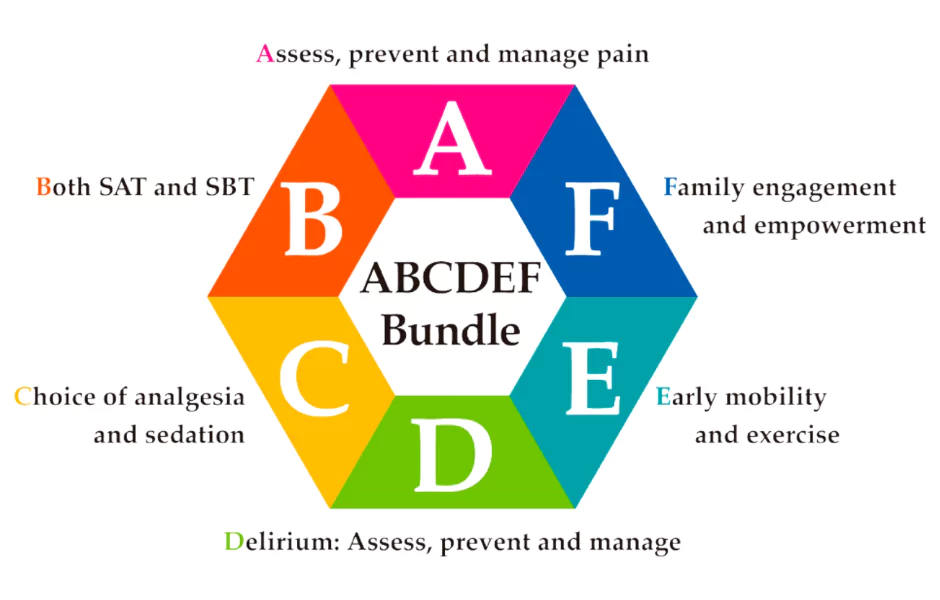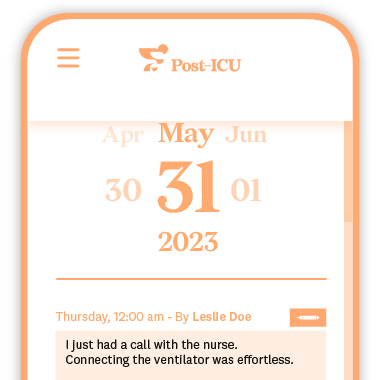Intensive care units save lives, but critically ill patients face a difficult journey:
- 60–80% of mechanically ventilated patients experience delirium as well as 20–50% of lower severity of illness ICU patients1Stollings, J. L., Kotfis, K., Chanques, G., Pun, B. T., Pandharipande, P. P., & Ely, E. W. (2021). Delirium in critical illness: clinical manifestations, outcomes, and management. Intensive care medicine, 47(10), 1089-1103
- all critically ill adult patients typically experience pain2Pota, V., Coppolino, F., Barbarisi, A., Passavanti, M. B., Aurilio, C., Sansone, P., & Pace, M. C. (2022). Pain in intensive care: a narrative review. Pain and Therapy, 11(2), 359-367.
- over half of ICU patients experience significant limitations in movement due to critical illness-associated neuromuscular abnormalities3Truong, A. D., Fan, E., Brower, R. G., & Needham, D. M. (2009). Bench-to-bedside review: mobilizing patients in the intensive care unit–from pathophysiology to clinical trials. Critical care, 13, 1-8.
Recognizing these challenges, we developed the Post-ICU Digital Diary as a tool specifically designed to address element F of the ICU Liberation Bundle – Family Engagement and Empowerment. The ICU Liberation Bundle, also known as the ABCDEF Bundle, is a comprehensive approach to improve patient outcomes and foster family engagement in the ICU. This article delves deeper into the elements of the ABCDEF Bundle, exploring practical strategies for successful implementation, with a particular focus on how the Post-ICU Digital Diary empowers families and strengthens their role in the care journey.
It's not just about keeping people alive. It's about trying to give people a quality of life after the ICU that is as good as possible
Seth Van der Meer, CEO of Post-ICU Tweet
Why Implement the ICU Liberation Bundle?
Improved Patient Outcomes
The positive impact ICU bundle implementation has on patients is evident, especially when it comes to improving patient outcomes and increasing satisfaction:
- Shorter ICU Stays: Studies show a decrease in average ICU stay length by 0.5 days and a significant drop (18,1%) in patients staying longer than 7 days.4Barr, J., Downs, B., Ferrell, K., Talebian, M., Robinson, S., Kolodisner, L., … & Holdych, J. (2024). Improving outcomes in mechanically ventilated adult ICU patients following implementation of the ICU liberation (ABCDEF) bundle across a large Healthcare system. Critical Care Explorations, 6(1), e1001.
- Shorter Ventilation Time: Patients experience a 0.6-day reduction in ventilator duration on average5Barr, J., Downs, B., Ferrell, K., Talebian, M., Robinson, S., Kolodisner, L., … & Holdych, J. (2024). Improving outcomes in mechanically ventilated adult ICU patients following implementation of the ICU liberation (ABCDEF) bundle across a large Healthcare system. Critical Care Explorations, 6(1), e1001.
- Lower Mortality Rates: The likelihood of hospital death within seven days decreases by 68%.6SCCM: ICU Liberation Bundle (A-F). Society of Critical Care Medicine
- Improved Patient Experience: The bundle reduces delirium and coma days by 25-50%, promotes early mobilization for improved physical function, and minimizes physical restraints (over 60% reduction).7SCCM: ICU Liberation Bundle (A-F). Society of Critical Care Medicine
- Reduced Anxiety and Confusion: Family engagement, a key element of the bundle, can significantly impact patients by lowering anxiety and confusion8SCCM: ICU Liberation Bundle (A-F). Society of Critical Care Medicine
Benefits for Hospitals
- Cost Savings: Reduced ICU stays and readmissions by 46% translate to significant cost savings for hospitals.9Pun, B. T., Balas, M. C., Barnes-Daly, M. A., Thompson, J. L., Aldrich, J. M., Barr, J., … & Ely, E. W. (2019). Caring for critically ill patients with the ABCDEF bundle: results of the ICU liberation collaborative in over 15,000 adults. Critical care medicine, 47(1), 3-14.
- Improved Efficiency: The bundle fosters better communication and a more streamlined approach to patient care, leading to increased efficiency.10Barr, J., Downs, B., Ferrell, K., Talebian, M., Robinson, S., Kolodisner, L., … & Holdych, J. (2024). Improving outcomes in mechanically ventilated adult ICU patients following implementation of the ICU liberation (ABCDEF) bundle across a large Healthcare system. Critical Care Explorations, 6(1), e1001.11Hsieh, S. J., Otusanya, O., Gershengorn, H. B., Hope, A. A., Dayton, C., Levi, D., … & Gong, M. N. (2019). Staged implementation of ABCDE bundle improves patient outcomes and reduces hospital costs. Critical care medicine, 47(7), 885.12Otusanya, O. T., Hsieh, S. J., Gong, M. N., & Gershengorn, H. B. (2022). Impact of ABCDE bundle implementation in the intensive care unit on specific patient costs. Journal of intensive care medicine, 37(6), 833-841.
- Improved Quality of Care: By prioritizing patient comfort, reducing complications, and promoting family-centered care, the bundle improves the overall quality of care in the ICU.13Otusanya, O. T., Hsieh, S. J., Gong, M. N., & Gershengorn, H. B. (2022). Impact of ABCDE bundle implementation in the intensive care unit on specific patient costs. Journal of intensive care medicine, 37(6), 833-841.14SCCM: ICU Liberation Bundle (A-F). Society of Critical Care Medicine
The ICU Liberation Bundle has been successfully implemented across various healthcare systems, demonstrating its sustainability and scalability. Multiple studies involving over 20,000 patients have confirmed the bundle’s effectiveness in improving outcomes and reducing healthcare costs.15SCCM: ICU Liberation Bundle (A-F). Society of Critical Care Medicine
The ABCDEF of ICU Liberation: A Patient-Centered Approach

The ICU Liberation Bundle outlines six key elements for providing optimal care in the ICU. Let’s explore each element and understand how it benefits patients.
A: Assess, Prevent, and Manage Pain
Effective pain management is a cornerstone of patient well-being in the ICU. Healthcare providers regularly assess patients’ pain levels and administer appropriate pain medication to keep them comfortable. This reduces stress and anxiety, allowing for better sleep and participation in therapy, all of which contribute to faster recovery.
B: Both Spontaneous Awakening Trials (SATs) and Spontaneous Breathing Trials (SBTs)
These trials play a crucial role in weaning patients from sedation and ventilation. During an SAT, sedation medication is gradually reduced to see if a patient can wake up and breathe on their own. SBTs briefly discontinue ventilator support to assess a patient’s ability to breathe independently. By conducting these trials as appropriate, healthcare providers can determine if a patient is ready to come off support, potentially reducing ventilator dependence and shortening the ICU stay.
C: Choice of Analgesia and Sedation
Selecting the most appropriate medications for pain and sedation is crucial for patient comfort and recovery. Healthcare providers individualize pain and sedation regimens based on the patient’s specific needs. This ensures effective pain relief while minimizing over-sedation, which can lead to delirium and longer ICU stays.
D: Delirium: Assess, Prevent, and Manage
Delirium, a state of confusion and disorientation, can be a serious complication for critically ill patients. Early detection and management are essential. Healthcare providers regularly assess patients for delirium and implement preventive measures like maintaining a day-night cycle and minimizing environmental disturbances. This reduces the negative impact of delirium on patient recovery, including increased hospital stays, cognitive decline, and mortality.
E: Early Mobilization and Exercise
Early mobilization and exercise are essential for promoting physical recovery in the ICU. Starting physical activity as soon as possible after admission helps prevent muscle weakness, improves physical function, and allows patients to return to daily activities more quickly after discharge. Healthcare providers gradually increase a patient’s activity level based on their tolerance, starting with passive movements and progressing to active exercises.
F: Family Engagement and Empowerment
Family engagement is a vital component of patient-centered care in the ICU. Healthcare providers actively involve families in care discussions, answer their questions, and facilitate their presence at the bedside whenever possible. Family presence provides emotional support and comfort to the patient, leading to reduced anxiety, improved communication, and better overall outcomes.
How Post-ICU Digital Diary Supports ICU Liberation
The ICU Liberation Bundle promotes a holistic approach to patient care, and the Post-ICU Digital Diary integrates with this philosophy. This secure digital tool acts as a valuable companion to the bundle, particularly when it comes to element F: Family Engagement and Empowerment.
- Contextualizes Medical Data: The diary goes beyond medical records by incorporating the patient’s and family’s experiences. This information helps patients understand their ICU journey, and contextualize their emotions, fears, and anxieties. This fosters a sense of control and well-being, contributing to a smoother recovery and improved quality of life. The ICU Liberation Bundle promotes a holistic approach to patient care, and the Post-ICU Digital Diary integrates with this philosophy. This secure digital tool acts as a valuable companion to the bundle, particularly when it comes to element F: Family Engagement and Empowerment.
- Streamlines Communication: The diary allows healthcare providers to document a patient’s progress and other relevant information. Families can access these updates securely, fostering a sense of connection and informed participation in the care process.
- Builds a Shared Narrative: PICS can manifest as memory problems, anxiety, and depression. The diary’s shared narrative helps patients reconstruct memory gaps by providing a chronological account of events with family input. This reduces confusion, improves information processing, and combats feelings of helplessness, all contributing to decreased PICS symptoms.
Extensive research has validated the ICU Liberation Bundle’s effectiveness in improving patient outcomes. However, successful implementation hinges on addressing all elements, particularly the often-neglected F: Family Engagement. The Post-ICU digital diary offers a unique solution, bridging this gap and empowering hospitals to fully realize the benefits of the ABCDEF Bundle.




